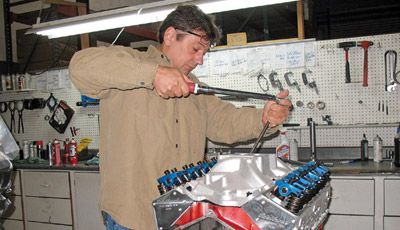
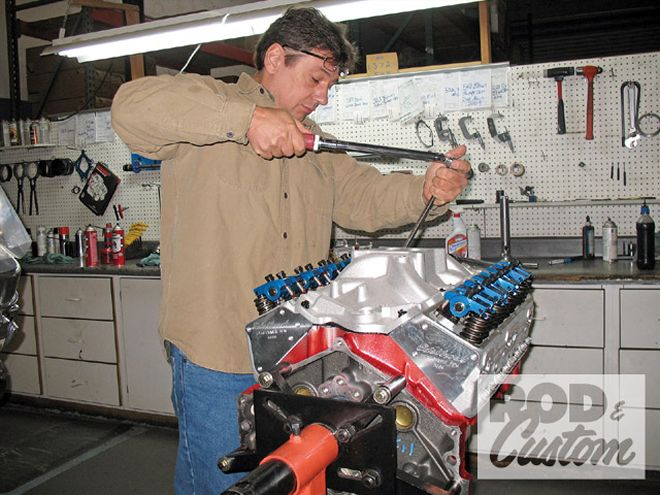
Crate motors. We're sure as readers you've noticed those two words cropping up more frequently in magazine car features over the past few years. I know those of us writing the features have seen it. The ability to purchase a complete, ready-to-go engine that just needs dress-up items can greatly speed up a project, as well as be a blessing for those who aren't inclined to build a motor themselves and previously had to pay someone to build it for them or maybe clean off a junkyard engine and bolt it in.
But there's great variation in crate motors and what you get for your money, performance-wise, parts-wise, and product-wise. Though I've built engines before, I'll readily admit it's not my first love or really my idea of fun, so the idea of a crate motor for my project '49 Chevy was definitely appealing, but which one? Do a little research and the range is staggering, even taking into account that I was only looking at small-block Chevys, as that's what I've set up the car for, so Fords, Mopars, and even GM big-blocks were, while available, not on my shopping list. The Chevy LS-series was also excluded from my search, as I lean toward the earlier, simpler motors with little or no electronics.
It quickly becomes apparent when researching crate motors that you have to decide whether you want a long-block or complete turnkey motor, what power output you're after, your driving style or what you'll use the car for, and what your budget is, then start making choices. If you select a long-block, how much more will all the ancillaries and extra parts add up to? A carburetor, intake manifold, ignition system, plug wires, valve covers, and gaskets can easily add up to $1,500 or more. Suddenly that budget motor may prove false economy. Conversely, you'll be able to choose exactly which parts you add to the motor, so you may decide this is the best option for you. Let's take a look at a selection of what's available out there, then see what will be powering my project, the Purple Pig once it's resurrected.
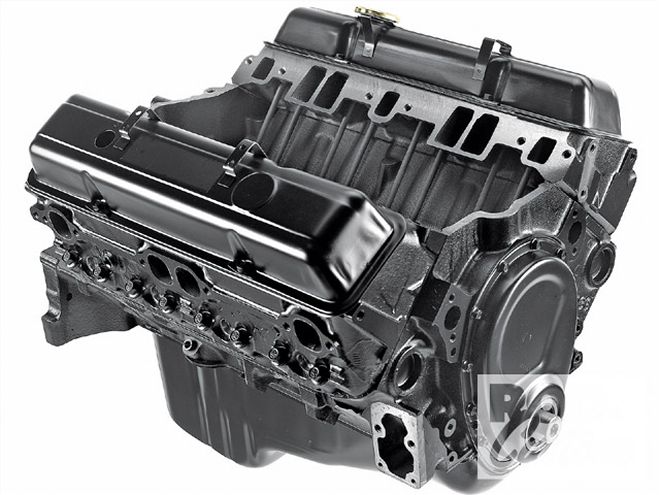 One of the most popular crate engines is the GM Performance Parts 290hp motor. With a great price and ideal for applications where high horsepower isn't required, this option does require many parts to make it a runner.
One of the most popular crate engines is the GM Performance Parts 290hp motor. With a great price and ideal for applications where high horsepower isn't required, this option does require many parts to make it a runner.
Though long-block remanufactured engines are available from auto parts houses, my search concerned aftermarket crate motors from known manufacturers, and one of the most popular crate motors currently available is the 290hp 350 from GM Performance Parts. Its big selling point is undoubtedly its price and value for the money, and delivering 326lb-ft of torque, GMPP describes it as "the perfect replacement engine for the millions of GM vehicles shipped with a small-block." With a four-bolt main block and flat tappet hydraulic L82 camshaft, it's supplied as a long-block with cast-iron heads, but you'll need to add an intake, carburetor, ignition system, starter, balancer, and water pump, as well as pulleys, valve covers, and the necessary gaskets, which will be no problem if you have them on an old engine you're replacing already, but if you have to buy them it'll push the price of the finished motor up dramatically. However, we know this is the engine of choice for many rodders for whom out-and-out performance isn't a priority, and the fact it can be accessorized to suit can also be a bonus.
The GMPP crate option list continues with a Turnkey 350 complete from carb to pan, pushing out 330hp and 380 lb-ft of torque, a 383 stroker (labeled the HT383 for High Torque) making 435 lb-ft, the ZZ4 350 at 355hp and 405 lb-ft with aluminum heads and hydraulic roller cam (available with intake, HEI distributor, flexplate, and iron water pump or as a complete turnkey motor), and the ZZ383, a high-performance (425hp and 449 lb-ft torque) stroker motor that GMPP bills as an 11-second motor. However, while you're assured that all parts in a GMPP crate engine are brand-new, none come with dyno sheets, unlike most of the crate engines I checked out. GMPP engines are available from GM Performance Parts as well as Summit Racing, the latter also offering blueprinted GM motors such as a 383 stroker long-block assembly as well as World Products 415 and 427ci Motown short-block assemblies for those wanting large-displacement small-blocks!
If it's a turnkey motor you're after, Edelbrock offers a mind-boggling nine different 350ci combinations, ranging from 310hp/375 lb-ft to 440hp/425 lb-ft, as well as a supercharged 350 at 507/487 and a 383 at 460/460, all based on new GM four-bolt blocks. All employ Edelbrock aluminum heads, manifolds, and either Performer or Thunder Series carburetors, not surprisingly, and for an extra outlay Edelbrock offers a dyno service on all its new crate engines on its in-house dyno, for break-in and power runs prior to shipping. The Edelbrock website has a very comprehensive list of engines and options available.
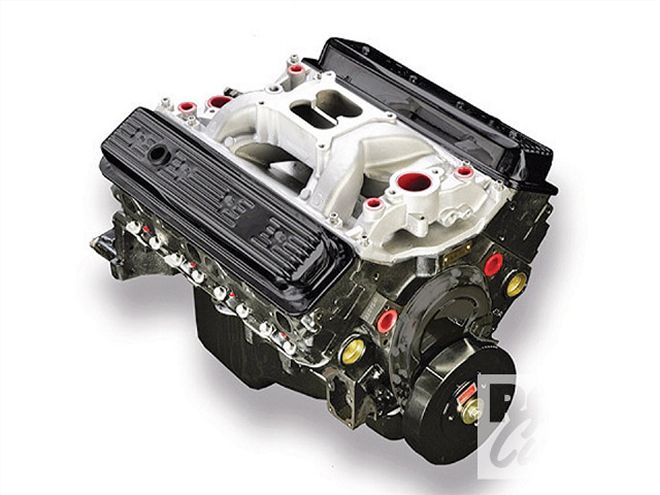 Year One's CT350PC1 crate motor uses a seasoned 350 block bored 0.030 over with a nodular iron crank, one-piece rear seal, and hypereutectic pistons. A hydraulic roller cam, ported Vortec heads, and dual-plane aluminum intake are part of the package producing 400+hp and torque. Each engine is blueprinted, dyno-tested, and supplied with a printout.
Year One's CT350PC1 crate motor uses a seasoned 350 block bored 0.030 over with a nodular iron crank, one-piece rear seal, and hypereutectic pistons. A hydraulic roller cam, ported Vortec heads, and dual-plane aluminum intake are part of the package producing 400+hp and torque. Each engine is blueprinted, dyno-tested, and supplied with a printout.
Year One has long been associated with muscle cars and parts, but its new Speed Shop catalog includes crate motors, the small-block selection ranging from a 400hp 355 based on a 0.030-inch over-seasoned 350 iron block, or the "Extreme Tork 383" with 430hp and 460 lb-ft, both employing Vortec heads and roller cams, to the "Power Crate 383" with aluminum heads producing 500hp and 480 lb-ft. All are dyno-tested and come with a printout and 12-month/12,000-mile warranty, though they're supplied minus a carb, distributor, and plug wires.
As well as big-block Chevy and Ford engines, Smeding Performance also offers a range of small-block Chevy motors, from its mild 380hp "350 Magnum," four different 383 combinations (Cruiser, Hot Rod, Extreme, and Blown) to the 427 Mighty Mouse. All are built and dynotested in-house and are supplied with dyno sheets. Smeding also offers its engines complete with carburetors, distributors, spark plugs, and plug wires. Add a water pump, fuel pump, and plumbing and they're ready to run. There's also the advantage of knowing the timing is preset and the carburetors have been tuned and jetted on the dyno so there's no need to adjust anything. Smeding Performance offers a comprehensive options list, too, comprising not just performance options and accessories, but blockpainting options, too! This sounded good to me, especially given the competitive prices, but which motor to opt for?
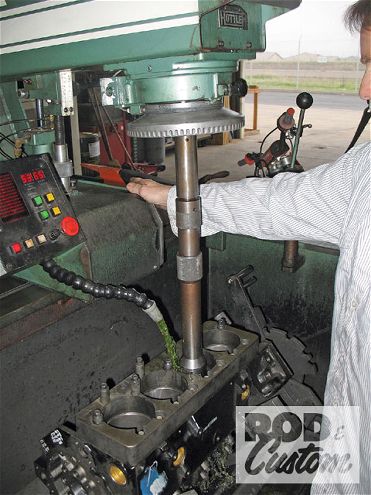 The new GMPP blocks have bore sizes that range from 4.000 inches to 4.002 inches. They are honed in-house to ensure they're all the same 4.003-inch diameter and have exactly 0.0015 inch piston-to-wall clearance with Smeding's own-brand pistons. A torque plate is bolted to the block with dowel pins and a gasket before Dan Moody uses a diamond cutter hone and coolant rather than a stone and oil. Computer-controlled machinery aids the process.
The new GMPP blocks have bore sizes that range from 4.000 inches to 4.002 inches. They are honed in-house to ensure they're all the same 4.003-inch diameter and have exactly 0.0015 inch piston-to-wall clearance with Smeding's own-brand pistons. A torque plate is bolted to the block with dowel pins and a gasket before Dan Moody uses a diamond cutter hone and coolant rather than a stone and oil. Computer-controlled machinery aids the process.
Sure, huge amounts of horsepower and torque always sound good, but realistically, how often do you really get to use 500+hp? Notice I didn't say need it because as hot rodders obviously we all need 500hp! But why pay the fuel bills that come with a high-performance motor unless you're building a dual-purpose street/strip car? I was looking for a motor that would offer plenty of torque (because if I travel north or east from where I live I have to traverse mountain passes) with a broad power range (because I drive my cars and have a heavy right foot!), yet offer some degree of reasonable economy (again, because I drive my cars a lot). The solution was Smeding Performance's 383 Hot Rod small-block, advertised at 400hp and 440 lb-ft of torque, though I watched my motor on the dyno producing a peak 420hp at 5,300 rpm and 468 lb-ft at 4,100 rpm. Other benefits of the 383 Hot Rod motor are that it only requires 89-octane gas, a mechanical fuel pump, a 2,000-rpm stall converter, and works well with overdrive transmissions and power brakes. In other words, it's perfectly streetable yet has plenty of torque and power when required.
Stroker 383
Smeding Performance only builds performance engines, ready to run and shipped already broken in on the in-house dyno, plus Ben Smeding seems keen to constantly improve his products, as evidenced by the continuing R&D with blocks, heads, and new motor combinations. A collaboration with Jenkins Competition on a 572ci big-block is forthcoming, along with new aluminum heads. A two-year unlimited warranty is offered on all Smeding engines, and there's a reason for that. Every part in an engine that is built by the company is new, from the fresh GMPP four-bolt main blocks upwards, and many are manufactured exclusively for Smeding Performance.
Starting with a new GMPP block means the crank bores are perfect, there are no possible cracks to deal with, and the cam bearings and freeze plugs are already installed. After clearancing the blocks for the rod bolts to compensate for the longer throw on a stroker crank and honing each cylinder to achieve the desired clearance for the custom hypereutectic pistons, the block is cleaned and dried in preparation for paint, in my case a custom red color. Then assembly can begin.